As expected
The history of public intellectuals facing personal attacks, and sometimes threats to their safety, is, sadly, a long one. Individuals, groups and sometimes entire states will turn to slander, lawsuits and at times persecution to silent those who, through their work, attempt to expose injustices that otherwise would remain hidden. Few subjects in recent years have so often given rise to this type of behavior than Israel’s occupation of Palestine.
It was with this in mind that I wrote my article “The insidious language of victimhood,” which appeared in the Taipei Times on April 18. I knew very well that by publishing an article critical of the Israeli military’s recourse to illegal methods — in this case using Palestinians as human shields — and putting my name on it would surely invite a type of attack that has become par with the course. Already, academics like Edward W. Said and Noam Chomsky, to name just a few, as well as reporters like Robert Fisk, are well known to have been slammed by Israel for their views on the Israeli-Palestinian conflict. More so, on some occasions the state-owned Canadian Broadcasting Corporation was attacked by the Israeli lobby for being “skewed” after inviting Fisk to participate in a program or of being “one sided” or “anti-Semitic” when it provided reporting on Israeli atrocities in the Occupied Territories. This type of censorship, a negative response to an article or report meant to silence their authors, is what Chomsky and Edward Herman in their book
Manufacturing Consent call “flak.”
So I received my first piece of “flak” yesterday, a letter sent to the
Taipei Times’ Letters to the editor by a Taiwan-based Israeli. The editor, for reasons that should soon become apparent, chose not to publish it, and I will not reply to that person directly. I have nevertheless chosen to dissect it here, an exercise that should allow me to put my theories to the test. Aside from demonstrating that the writer’s arguments soon crumble upon scrutiny, responding to them gives me an opportunity to expand on some of the points I tried to make in my article.
As if often the case when flak is at play, the letter constitutes more of a personal attack than an argument resulting from solid research, and the writer oftentimes commits the very intellectual crimes he accuses his “opponent” of having committed (the so-called “one-sidedness). “There is no other way to describe the piece except as total rubbish,” the writer begins, in reference to my article, which he says was by a “writer.” Already, the writer's position of opposition is clear and furthermore the writer questions my abilities or professional skills by putting my title between quotation marks. I am not a writer, he writes. I am a “dupe.” (These types of remarks bear all the hallmarks of thought processes as part of a totalitarian state, of the type that I constantly encountered when I worked for an intelligence service.)
He then presses the matter by writing that readers “are not told of any expertise or relevant experience” on the issue that I write about, which he then argues explains why I was so easily deceived by the writings of Edward Said, a Palestinian. Aside from the fact that he also fails to mention any expertise of his own on the subject, readers here would know that I have a master’s degree in War Studies, which included a course on asymmetric warfare; a diploma in humanitarian assistance, where I met many aid workers who worked in the Occupied Territories; a diploma in peacekeeping; and that I worked for three years as an intelligence officer on the very issue of “Islamic terrorism,” including 14 months where I was in regular contact with Israeli intelligence officers. And yet the writer portrays me as a “gullible person” who “swallowed the rhetoric hook, line and sinker.” He then accuses me of being “oblivious” to the basic tenets of journalism, which hold that one should analyze both sides of a topic. In other words, the writer accuses me of bad journalism because he assumes I am only basing my assessment on Said’s work, which he erroneously says I quote in my article. The fact is, Said (and other “pro” Palestinians) constitutes only a small proportion of the enormous amount of reading I have done on the issue. During my graduate studies at the Royal Military College, most of the assigned readings on the Middle East came from think-tanks like the RAND Corporation, CSIS, the US Naval Institute, the CIA and other US centers attached to the defense and intelligence establishments — all hardly presenting material in favor of Palestinians. Moreover, in the more public sphere, I have also read, among others, Thomas Friedman, Shlomo Ben Ami and Fouad Ajami and many academic "specialists" on terrorism, such as Bruce Hoffmann and Walter Laqueur. Again, these tend to provide a view that is favorable to Israel. Lastly, as an intelligence officer, I read hundreds upon hundreds of classified reports, domestic and foreign, on the issue of Israel and its regional enemies and also spent more than a year writing threat assessments, as well as a Federal Court warrant against a Levant-based organization. Needless to say, not a single page written in the documents that I read while working there painted anything remotely close to a position favorable to Palestinians. In fact, such documents are paranoid in the extreme and see Palestinians as anythign but victims in the conflict. So the writer’s contention that my article — and the conclusions reached — were singly the result of my having been influenced by Said’s “propaganda” is invidious at best.
The writer, who cannot spend enough time blasting Said (a national past time, in some quarters), then writes that Said comes from a culture where “criticism of the Palestinians or any exoneration of Israel were tantamount to a death sentence.” Here, the writer seems to conveniently overlook the fact that throughout his life Said was attacked by both sides, as he spared neither. Not only did he never condone the use of Palestinian violence and the tactic of suicide bombings (as I do not), but he also relentlessly criticized the Palestinian authorities for their incompetence and corruption. The writer also fails to note that despite his origins, Said lived a long life in exile and was based in New York City, where he taught at Columbia University, thus making his “death sentence” argument a moot point.
The writer then argues that I should stick to “facts” and “logic” rather than appeal to the emotional. He takes issue when I write that throughout his life Said had “exposed the grave injustice done to Palestinians,” adding that I accept the “unproven premises” of Palestinians as victims and a media conspiracy to “conceal the truth” (his quotes, not mine). Sticking to facts for a moment, it is difficult to imagine anyone who has been alive in the past sixty years who could deny, based on facts, that the Palestinians have not been victims. Not only were they expelled from their homes, with millions to this day still living in atrocious conditions in refugee camps throughout the Middle East, but on a daily basis they are exposed to Israeli bombings, incursions, arrests without due process, disappearances, discrimination, long waits and searches are Israeli-created borders, and so on. To write that Palestinian is an
unprovenpremise is nothing but morally repugnant.
After attacking me for my apparent lack of historical knowledge, the writer then questions my use of the term “illegal” to describe Israeli occupation of Palestinian territories. Leaving aside the amorality of the occupation and strictly sticking to legal matters, in terms of international law any territory gained by the use of force and held as such is illegal, which means that territory seized by Israel in the 1967 war it is holding illegally. Furthermore, by repressing an entire population because of a minority elements (Hamas, Palestinian Islamic Jihad, the Lebanese Hezbollah) who have turned to violent resistance, it is breaking the Geneva Convention. When it razes villages, destroys houses of suspected “militants” or terrorists, steals large quantities of potable water and uses carpet-bombing methods to arrest individuals suspected of involvement in “terrorism,” Israel is illegally occupying a people and illegally using force against them. These are the facts.
The one-sidedness of my argument, if we follow the author’s logic, is that I do not talk about Palestinian violence in my article. What he fails to understand, however, is that this is not the topic of my opinion piece, as I was focusing on the use of language to describe
Israeli military action against Palestinians. Furthermore, every day people the world over are bombarded with images and news of Palestinians “terrorists” and “radicals” and “militants” and “extremists” attacking Israelis or, more recently, killing each other. Everybody is aware of that and there is no question that it does happen. What I did seek to expose, though, was that every time Israel uses force, it is depicted as self-defense or, for the more sardonically inclined among us, to liberate Palestinians, to save them from themselves, as it did in Lebanon in the 1980s (or the US did in Vietnam and Iraq, or the Soviet Union in Afghanistan). Moreover, my piece did not state that there is a “conspiracy” to hide the truth (otherwise I would not have used the term “insidious”), but rather an intellectual reflex, sometimes unconscious, to depict Israel as the victim no matter what it does. A Palestinian who calls for violence against Israel is depicted in the media as a radical or a terrorist. Why, then, won't an Israeli commander ordering the destruction of an entire neighborhood in Beirut, knowing fully well that doing so will kill countless civilians and achieve little of military significance, also be described in the media as a radical or an extremist (let alone a terrorist)? The only difference between the two is that he is part of a modern army equipped with modern weapons non-state groups like Hamas and Hezbollah could only dream of ever putting their hands on, and that for years his side has been depicted as the victim. As long as it is self-defense, it seems that it cannot be called a crime or an atrocity.
If, again, the writer of the letter wants facts, he should look at the cold numbers of victims in the numerous wars Israel has fought since its creation in 1948. In every one of them, the ratio has been somewhere around 1:10, the latter number being that of its enemies, thanks to overwhelming US military support, to the order of (what we know of) US$5 billion every year. In fact, so dedicated is the US to Israel that last week it was already announcing the resumption of sales of MK-84 "general purpose" cluster bomb munitions, worth US$65 million, to Jerusalem (3,500 of them, as per Israel's request), after a brief interruption in the wake of Israel’s illegal (yes, it is illegal as per international law) use of them in civilian areas in Lebanon, which resulted in a number of deaths and casualties after the hostilities had ended.
What the writer ultimately fails to recognize (because he is committing the very error of becoming emotional, as opposed to rational, on the issue), is that at no point do I state that Israel has no right to defend itself, nor do I ever refer to all Palestinians (or Hezbollah, with which I am quite familiar) as “peace-loving” (a cynical use by the author, in reference to the ungrateful Palestinians who turned down a peace offer that included a non-viable series of disconnected statelets that only a people facing a powerful military could ever be asked to contemplate, something else this so-called history savvy author conveniently omits). What I question is language that claims the Israeli military was “forced” (Associated Press) to turn to illegal tactics (the use of human shields, a crime of war) to conduct door-to-door operations in Palestinian territories. Having studied asymmetric warfare, I could be tempted to condone the recourse to suicide bombings as the result of an unequal armed conflict, in which one side has one of the world’s most powerful and modern military and the other has not air force, no navy, no helicopters, no cluster bombs but only small arms and home-made explosives. But I do not. I do not condone, nor do I support, the targeting of civilians by suicide bombers, or Hezbollah’s firing rockets at Israeli civilian positions. These are, without any question, illegal acts of war, as my previous writings have shown. From a tactical perspective, however, we can try to understand
why Palestinian "militants" turn to such military uses, and it soon becomes evident that it would be suicidal for them to engage the Israeli military directly.
Hezbollah’s rocket attacks against Israel during Israel’s war in Lebanon last summer were illegal, and the reason I do not discuss these when, in my article, I refer to Israel’s use of cluster bombs is, again, because it is not the issue. My article was about the use of language to describe Israeli action. Just because it was using a modern military to “defend” itself (initially to free two Israeli soldiers who had been kidnapped by Hezbollah) doesn’t mean it could use its overwhelming military force to destroy a great deal of the Lebanese civilian infrastructure and kill more than a thousand civilians in the process, ten times more Lebanese — mostly civilians — than Israeli died in the conflict (mostly soldiers).
Finally, the writer attacks my conclusion, which he sardonically calls “brilliant,” that language that truly reflects reality is needed. Whether one agrees with my position is for the reader to decide. But a spade needs to be called a spade. If such language had been honestly used from the onset, perhaps there would have been more pressure on Washington — from within the US and at the international level — to stop it from launching a war against Iraq, ironically another war of “self-defense” and, post facto, when weapons of mass destruction were not discovered, to “liberate” the Iraqis, to save them from themselves. The same holds for Israel and Palestine. If Israeli actions were truly exposed for what they are, states that sell them modern military equipment would perhaps think twice. And the real victims — the Palestinians (this is not naïve use of propaganda but something that is based on facts and numbers and history) — would perhaps not feel as abandoned and wronged against as to believe that the only recourse left is to strap explosives against their waist and blow themselves up at a bus stop.
 In an article appearing in the May 21, 2007, issue of the Taipei Times, I take the discussion on Taiwan’s failed bid to become a full member of the World Health Organization (WHO) further and propose alternatives through which Taiwan could still tap into the global health resources and share its expertise with the rest of the world without having to rely on Geneva. Using a warfare analogy of a weak opponent facing a strong one, I argue that what Taipei must do is adopt guerrilla tactics, by attacking the stronger opponent — the UN-China nexus — where it is weaker by taking advantage of the possibilities offered by the 21st century in terms of connectivity and technology. In other words, what I propose for Taiwan is that it bypass the WHO altogether.
In an article appearing in the May 21, 2007, issue of the Taipei Times, I take the discussion on Taiwan’s failed bid to become a full member of the World Health Organization (WHO) further and propose alternatives through which Taiwan could still tap into the global health resources and share its expertise with the rest of the world without having to rely on Geneva. Using a warfare analogy of a weak opponent facing a strong one, I argue that what Taipei must do is adopt guerrilla tactics, by attacking the stronger opponent — the UN-China nexus — where it is weaker by taking advantage of the possibilities offered by the 21st century in terms of connectivity and technology. In other words, what I propose for Taiwan is that it bypass the WHO altogether.











